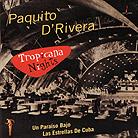November 1999
Tropicana Nights, then, prior to any listening, gives off to the initiated already a very heady perfume that resurrects to life a certain milieu and era -- the explosive mixture of North American jazz and rhythm-heavy Cuban dance music in the context of '50s big-band format. This required a sax quintet, a brass sextet and the ubiquitous heavy Cuban artillery of percussion, timbales, bongos and congas, and perhaps piano plus the occasional solo vocal with full-answer chorus. With the exception of a slightly reduced head count in the brass section -- one trumpet, one trombone -- Paquito’s actual lineup on Tropicana Nights duplicates the traditional big band of yesteryear to a "t." Unlike jazz that too often is mental and is appreciated best on more abstract terms, Cuban, and most of Brazilian, music tends to be extremely earthy, of the body, rooted in dance and thereby is quite the antithesis of cerebral. A lot of the current work by Cuban trumpeter Jesus Alema˝y of Cubanismo! fame shows off its high-octane, instrumental virtuoso aspects. This means accelerated tempi and a revved-up ferocity to go beyond danceable, into stylized versions that test the technical fortitude of the soloists and place extreme burdens on ensemble coherence to hold together under the onslaught of the maddening off-beat syncopations at break-neck speeds. Tropicana Nights, on the other hand, concentrates primarily on bossa, cha-cha and mambo-based rhythms. Before Cuban connoisseurs shoot me with cigar-loaded missiles, I confess that there must be more specific terms used properly by hard-core aficionados to differentiate with a finer-tipped brush the different styles presented. Those who love this music without an insider’s reference ought to nonetheless get a reasonably close fix on the real thing by thinking mambo or bossa nova. What we have here then is superbly executed Latin big-band fare, deftly arranged and delivered with just the right mixture of intensity and elegance -- and the occasional sax or clarinet solo by the maestro himself -- to infect even the lead-footed listener. Care to mambo? Highly recommended, and due to the superb sonics, perfect demonstration material also for late-night audiophile shoot-outs. GO BACK TO: |
 Paquito D'Rivera - Tropicana Nights
Paquito D'Rivera - Tropicana Nights![[Reviewed on CD]](../format/regcd.gif) If you
thought this album’s title referred to nocturnal chugging sessions of exotic fruit
juice blends Ó la mango-papaya-guava, you would have at least gotten the tropical-island
angle right. In the liner notes, Paquito D’Rivera quotes Spanish novelist Miguel
Barrose as discovering in La Habana’s 1958 telephone directory of 1112 pages no less
than 1170 bars and lounges with musical ambience, 100 record stores, 250 recreation
centers and social clubs hosting musical affairs and some 50 popular orchestras.
If you
thought this album’s title referred to nocturnal chugging sessions of exotic fruit
juice blends Ó la mango-papaya-guava, you would have at least gotten the tropical-island
angle right. In the liner notes, Paquito D’Rivera quotes Spanish novelist Miguel
Barrose as discovering in La Habana’s 1958 telephone directory of 1112 pages no less
than 1170 bars and lounges with musical ambience, 100 record stores, 250 recreation
centers and social clubs hosting musical affairs and some 50 popular orchestras.